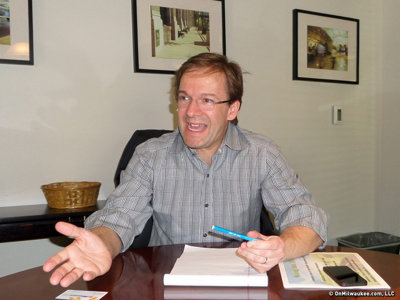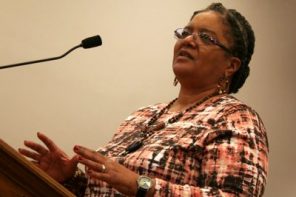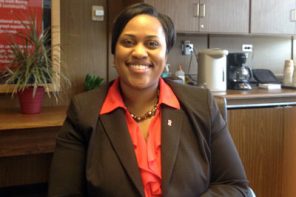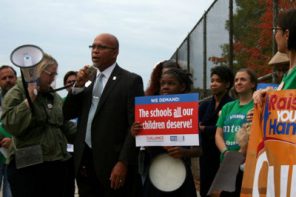Milwaukee County Executive Chris Abele said he didn’t ask to be put in charge of turning around some chronically underperforming schools in Milwaukee.
But he also told OnMilwaukee.com last week that he will not shirk his responsibility to make the plan – authored by Republicans Sen. Alberta Darling and Rep. Dale Kooyenga and amended to the state budget – work.
The plan was passed by the legislature this week and now goes to Gov. Scott Walker. Walker has said all along he will sign the budget before he announces his presidential candidacy and that announcement is set for Monday in Waukesha.
Under the plan Abele would appoint a commissioner to take control of up to three underperforming schools in the 2015-16 school year. Each year thereafter he could take over up to five schools.
“I didn’t ask for this,” Abele said. “In fact, when I spoke to Dale and Alberta initially about this, I said this isn’t the approach I would take, and they asked me what approach I would take.
“I said that I would propose a change in governance, and when he was running for mayor, I flew Tom Barrett to Boston to talk with the people who had gone through a mayoral change from the school board out there. That wasn’t the only model but they had some success with it. It’s had some pretty good results and I wanted him to be able to talk to some people who had implemented it.”
Governance – who should run a school district – is an almost constant topic in urban school systems and Wisconsin has been a laboratory for some efforts, such as the school voucher program – which is a kind of governance shift – and open enrollment throughout the county.
The elected Milwaukee Public Schools Board of Directors, as well as a number of MPS support groups, are opposed to the proposed change. Critics say claims the plan is a move to take over and privatize the entire system. Others complain that a change in governance doesn’t get to some of the root problems of underperforming schools.
“One of the things I said to them (Darling and Kooyenga),” Abele said, “is if I do this, I want to be able to keep coming back to you guys, and as we see what works and what doesn’t, your assurance that you’ll stay open to changes because maybe we can find a way to address some of the other issues, too.”
“There’s a lot of issues,” he added. “Every youth-serving group you will work with nationally, and I continue to also serve in the Boys and Girls of America board, will tell you the decline of the sustained adult relationship is a major factor. The most well-meaning nonprofits, the best government programs in the world can only do so much to impact that dynamic.”
Abele, who has more than a nodding acquaintance with money, budgets and effective allocation of fiscal resources, understands as well as most the complicated and difficult financial situation MPS is in.
“The voucher system as it’s currently put together is really designed unfairly,” he said. “It punishes, fiscally, MPS. Basically, MPS loses funding at a rate that’s disproportionate to the recipients of that funding, and those are still issues.
“The other big structural issue is MPS has, and this isn’t the fault of anyone there, (is) they’ve got a boatload of debt and they’ve made some significant strides at working on that. When people talk about the number per student that comes from the state to MPS, they generally leave off the fact that a percentage of that number goes to cover debt service so basically, it’s a lot less per student. That’s a very real issue.”
Abele is coy about any specific people he would consider to fill the role of new commissioner, if this plan goes into effect (and it appears it will, unless the governor removes it).
“What I look for when I’m hiring anybody: experience and competence in the relevant field,” Abele said. “In this case, what do you know about education? Have you been around turnarounds before specifically? Also, anybody who is going to be able to or try to lead change needs to be good at having ideas that are worth buying and has to be skilled at working with people.
“I’m still involved in a bunch of nonprofits in and around education. I know a lot of folks at MPS. I know a lot of folks in the charter system. I know a lot of the usual players and I’ve got a big group where I’ve already reached out for everything from ideas on commissioner ideas, on structure. Interestingly, ideas on budget.”
Abele said he has worked with Milwaukee Public Schools Superintendent Darienne Driver and that he’s “excited” about the job she has been doing.
The County Executive agrees that starting with just one school is a good idea and one that gives any turnarounds a better chance to succeed.
“That’s one of the things I said to Dale and Alberta,” he said. “Focus. Get what you can do right, right first. Build the capacity but build based on demand, only when you’ve got a solid foundation. The worst thing that you can do is set high expectations and miss them.”
One of the major concerns about this program is that if it continues, with more and more schools removed from the district each year, the inevitability is that due to shrinking enrollment and revenue MPS will become fiscally nonviable.
“I understand that,” Abele said. “To be clear, if I thought even in the first year, if there’s enough evidence to show this approach just isn’t going to work, there’s some structural issues that are just going to make it unworkable, I would lobby to change this.
“Conversely, if in that model, say five years out, you’ve got the handful of schools that most people think are doing at least a little bit better, I would say, ‘hey, is there any way to preserve what is good and what has allowed this to happen in legislation and remove anything that indirectly hurts MPS in the process and other ways, we can carry some of the good ideas in MPS.’ There’s no point on that timeline where I’m going to be making a decision based on anything other than my best sense of what’s best for the system at large. Not just the (individual) schools.”
Abele said he has no illusions that this plan is a silver bullet that is going to cure all that ails a large urban school system like MPS. But he has the kind of courage to take a bold chance.
“I don’t see it as a panacea,” he said. “I’d rather be on the side of suggesting any idea that might improve MPS rather than simply sit on the sidelines saying I don’t like that attempt to improve it and idly watching while something I think we all agree, we need to do better at, as it continues to worsen.”


 i evaluate to yes even if there's no image
i evaluate to yes even if there's no image  i evaluate to yes even if there's no image
i evaluate to yes even if there's no image  i evaluate to yes even if there's no image
i evaluate to yes even if there's no image  i evaluate to yes even if there's no image
i evaluate to yes even if there's no image  i evaluate to yes even if there's no image
i evaluate to yes even if there's no image  i evaluate to yes even if there's no image
i evaluate to yes even if there's no image 